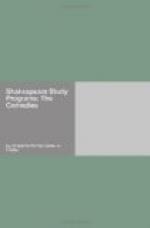POINTS. 1. The jokes of Act II: their explanation (i.e., ‘dollar’ and ‘dolour,’ the ‘eye of green,’ etc.). 2. When were watches first used in Europe? 3. Tell the story of AEneas and Dido. 4. What myth is alluded to in ‘his word is more than the miraculous harp’? 5. Gonzalo’s Commonwealth—its origin from Montaigne. It is commonly supposed that Shakespeare must have borrowed this reference from the translation. He may have taken it directly from the French. 6. Show the bearing of Sebastian’s phrase, ‘I am standing water,’ with its context. (That is, at the turn of the tide between ebb and full.) 7. ‘The man i’ the moon,’ and the folk-lore about it. 8. Natural history on the island. (Poet-Lore, April, 1894. Notes and News).
QUERY FOR DISCUSSION
Is it a defect in the action of the play that the danger arising from the most important counter-plot is allayed so soon?
ACT III
NEW PLOTS AGAINST PROSPERO
What new turns are given events in Act III? Scene i continues Ferdinand’s love-making, and shows no hinddrances there to Prospero’s plans; but scene ii develops Caliban’s plot, and scene iii shows Sebastian and Antonio making ready to carry out the purpose which had at first been defeated. Give an account of the scene in Act II which leads up to this plot in connection with its sequel in this act. Ariel is baffled in his attempts to breed contention between the conspirators by Trinculo’s good nature, but finally he leads them off with his music. Scene iii represents Alonzo and his courtiers bewildered and tired by their fruitless tramps through the island, and in just the temper to be confused by the dumb-show and the harpies. Note the dependence placed, throughout ‘The Tempest,’ on the effect of ‘solemn and strange music.’ Antonio’s plot, being resumed, is blocked by Ariel’s magic show and his accusation. Note how the supernatural quality of the scene makes his speech affect their consciences as if they were themselves accusing themselves, and how it drives them into mental disorder. Dr. Bucknill, a specialist in brain disease, who has commented on Shakespeare’s knowledge of such maladies, explains that Alonzo’s frenzy leads him by an imaginative melancholy to the idea of suicide, while the madness of Antonio and Sebastian expresses itself in the idea of desperate fight.




